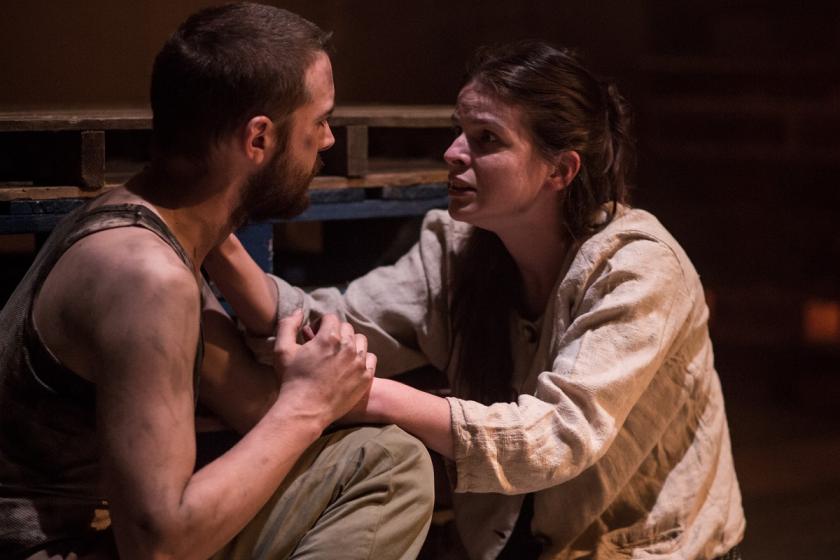Southwark Playhouse's new production of The Love Girl and the Innocent is London’s first in over 30 years, and there’s a reason Alexander Solzhenitsyn’s play rarely reaches the stage: it’s a lumpy mammoth of a script, demanding a cast upwards of 50, with stage directions that would be monumental if interpreted literally.
Matthew Dunster does the only thing possible, paring it all down to the roughest edges, and does so brilliantly. Visually we've got exposed graffitied walls, wooden pallets and planks and a heap of tyres that define the prison parade ground and construction sites, where metal bangs. Trains clatter in the distance, and there's a chill in the opening air: it’s Autumn 1945, and another convoy of prisoners, human resources to be battered into both submission and meeting productivity quotas, has arrived. Surviving, for staff and inmates alike, means finding the cushiest corner available in this bureaucratic quagmire, and going along with the system.
 In this Jagged Fence and Bigpicnic show, Dunster has honed the cast down to 16, with plenty of doubling: creating a distinguishing identity for every character was always going to be challenging – Solzhenitsyn didn’t overwrite the roles. A single note of definition works most immediately, whether it’s the scuttling, stammering hurry of one-armed Angel (Jack Johns), the massive figure and slow lilt of Yakhimchuk (Daniel Stewart), or the well-fed smarminess of the clerk Solomon (Rob Tofield).
In this Jagged Fence and Bigpicnic show, Dunster has honed the cast down to 16, with plenty of doubling: creating a distinguishing identity for every character was always going to be challenging – Solzhenitsyn didn’t overwrite the roles. A single note of definition works most immediately, whether it’s the scuttling, stammering hurry of one-armed Angel (Jack Johns), the massive figure and slow lilt of Yakhimchuk (Daniel Stewart), or the well-fed smarminess of the clerk Solomon (Rob Tofield).
Accents help considerably, ranging through all varieties of British regional to tinges of brutal Afrikaans or superior Australian. If that sounds all over the place, it isn’t: Stalin’s gulag was truly democratic, snaring the widest swathes of humanity, across class and occupation, hauling in the educated and the streetwise, hardened criminals and engineers, city-dwellers and those from the remotest corners of the country. It works that the token “real” foreigner, Romanian foundryman Munitsa (Kurt Kansley), speaks in parodic Spanish waiterese.
Love Girl is as much about the absurdities of a production system as the cruelties of a prison camp. Close your eyes and you could (almost) move the action to some lumbering nationalised factory elsewhere, with its skivers (here, the professional criminals), those who will pull the stops out for the right bribes, and those born good workers; the bureaucrats push paper to make it all supposedly function. Except that the benefits of a sick note here from Mereschun the doctor (Ben Onwukwe, magisterially all-controlling, above right, with Rebecca Oldfield) aren’t just an extra day or two off, but the difference between surviving or not. Even the collaborators can be consumed by the system they serve: the play’s final moment has the guard who has just sent off another batch of prisoners included in the same convoy (pictured below left, Adam Venus, centre).
 Which actually leaves less room than you might expect for the title characters, the “innocent” Nemov (Cian Barry, lean and already hungry, though he’s only just reached prison camp), and the “love girl” Lyuba (Rebecca Oldfield, taking over late in rehearsals from Kathryn Prescott). Nemov may be the play’s moral compass, Solzhenitsyn’s alter ego even, but we understand just how annoying his attempts when he’s in charge to stick to principles must be. The others rightly mock him as a “back-room lawyer”: in fact, he’s a lost naïf in a place where no laws apply. After the interval, and his demotion from responsibility to a foundry job, Nemov’s a different man, happier, not only because of his new passion for Lyuba. Oldfield has the most challenging role: we see Lyuba's emotions blaze for so short a time with Nemov (main picture, above). Then she condemns herself to survival – she’ll live, but the brief dream of anything else has gone forever. Oldfield can still discover something more in the part.
Which actually leaves less room than you might expect for the title characters, the “innocent” Nemov (Cian Barry, lean and already hungry, though he’s only just reached prison camp), and the “love girl” Lyuba (Rebecca Oldfield, taking over late in rehearsals from Kathryn Prescott). Nemov may be the play’s moral compass, Solzhenitsyn’s alter ego even, but we understand just how annoying his attempts when he’s in charge to stick to principles must be. The others rightly mock him as a “back-room lawyer”: in fact, he’s a lost naïf in a place where no laws apply. After the interval, and his demotion from responsibility to a foundry job, Nemov’s a different man, happier, not only because of his new passion for Lyuba. Oldfield has the most challenging role: we see Lyuba's emotions blaze for so short a time with Nemov (main picture, above). Then she condemns herself to survival – she’ll live, but the brief dream of anything else has gone forever. Oldfield can still discover something more in the part.
Ensemble playing is high calibre, and Anna Fleischle’s design makes full and inventive use of the Southwark space. Dunster’s Love Girl burns like a spark in darkness. Catch it before it goes out.
- The Love Girl and the Innocent at Southwark Playhouse until 2 November















Add comment